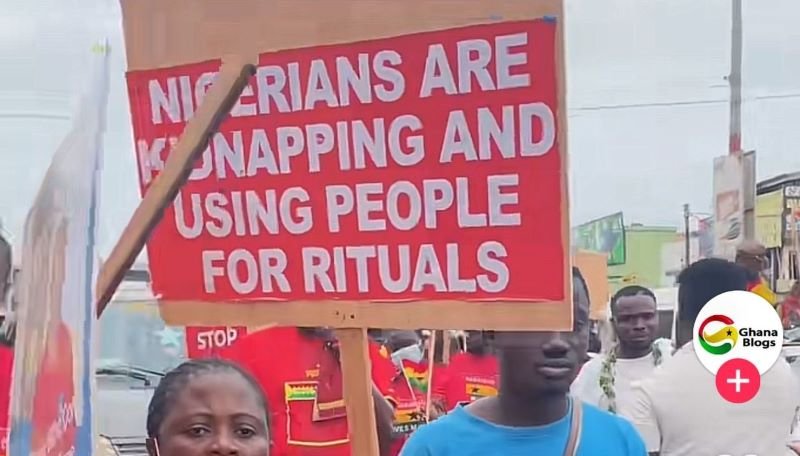TENSIONS have flared in parts of Ghana as hundreds of citizens took to the streets demanding the expulsion of Nigerians from the country over allegations of rising crime, including prostitution, ritual killings, kidnapping, and market dominance.
News Point Nigeria reports that in a viral video that surfaced on social media on Tuesday, protesters, many of them young adults were seen carrying placards with incendiary messages targeting Nigerians, particularly those from the Igbo ethnic group.
Some of the placards read: “Nigerians are kidnapping and using people for rituals,” “Our health at stake due to mass prostitution,” “Our kids are getting missing because of Igbos,” and “Armed robbery and violent attacks must stop.”
One of the protest leaders, a visibly enraged woman in her mid-thirties, declared in the footage: “Nigerians must go because you can’t be in someone’s country and be doing anyhow. Nigerians must go!”
Another protester claimed that Nigerians were “taking over Ghana’s major markets” and “violating Ghanaian laws” by engaging in businesses traditionally reserved for citizens.
“These Igbo people are everywhere. They have targeted our markets, seized our lands, and even crowned an Igbo king in Ghana. Our laws don’t even allow this kind of foreign infiltration. If we don’t act now, we’ll lose our country,” the man asserted.
The protest reportedly followed a recent murder case involving a Ghanaian allegedly killed by a Nigerian in the Accra area.
A photograph of the deceased was carried by demonstrators, further stoking the flames of public outrage.
While ethnic tensions between some Ghanaian nationals and Nigerian immigrants have flared in the past, this latest protest has ignited fears of xenophobia and a resurgence of anti-Nigerian sentiment.
This development evokes painful memories of the 1983 “Ghana Must Go” episode, when the Nigerian government under President Shehu Shagari ordered the expulsion of nearly two million undocumented immigrants, most of whom were Ghanaians.
At the time, Ghanaians were accused of contributing to rising crime and economic instability in Nigeria.
President Shagari had said then: “Illegal immigrants, under normal circumstances, should not be given any notice whatsoever. If you break a law, then you have to pay for it.”
The mass deportation not only strained diplomatic relations between the two countries but also birthed the now infamous “Ghana Must Go” bag used by departing migrants to pack their belongings symbolizing displacement and exclusion.
An ex-international diplomat, Ibrahim Animashun told News Point Nigeria that history may be repeating itself in reverse, as some Ghanaians echo the same language and sentiments once directed at them by Nigerians over four decades ago.
As of the time of this report, the Ghanaian government has yet to issue an official statement addressing the protests, the allegations, or any plans to deport Nigerian nationals.
No response has also been given by Nigerian diplomatic authorities in Ghana.
The ex-diplomat warns that failure to swiftly intervene could trigger a regional diplomatic crisis and jeopardize the long-standing relationship between the two West African nations.







